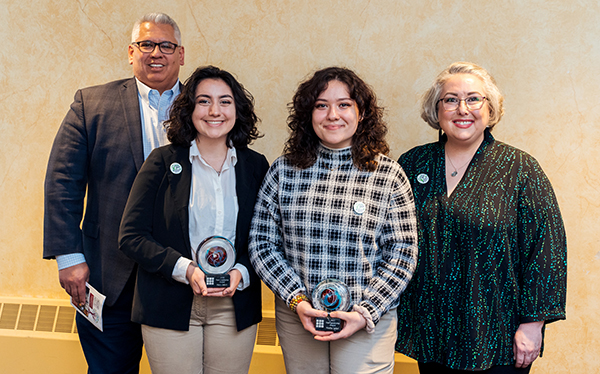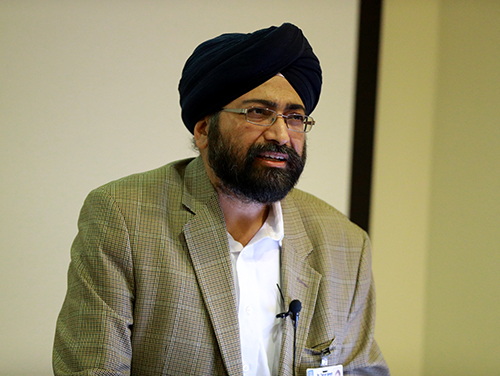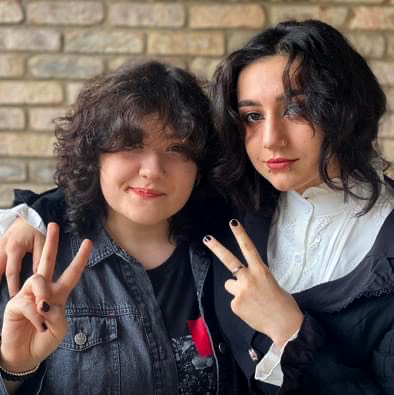Jennifer Campos’ two teenage daughters were vivacious and active, excelling in school and seemingly living without a care in the world.
Until they weren’t.

Sisters Hala Jabri, center left, and Nadia Jabri, center right, with their stepfather, Eddie Campos, and mother, Jen Campos, after receiving the Mental Health and Recovery Services Board of Lucas County’s 2023 Teen Leadership Award.
It was the depths of COVID-19’s first wave, and the isolation wrought by lockdowns and social distancing was taking a significant toll on their mental health, which Campos now realizes had already begun to deteriorate.
“They were in their rooms by themselves, on their phones, watching TV and sleeping a lot if they weren’t doing their online school,” she said.
Campos recognized something was wrong and had moved to get her daughters into therapy and on medication for depression in early 2021. She didn’t realize how serious the situation had become, however, until a suicide attempt by her older daughter, Nadia Jabri, late that year.
Her daughter Hala Jabri, who is about two years younger than her sister, Nadia, had also attempted suicide — something Campos didn’t learn until after Nadia’s attempt.
Within a matter of weeks, both Nadia and Hala were admitted to the Kobacker Center, an adolescent mental health treatment unit at The University of Toledo Medical Center.
“I credit Kobacker with saving their lives. For me as a parent, I didn’t know what to do,” Campos said. “It was absolutely necessary, and the people were amazing. The nurses, the doctors — we felt like everyone there really did help them. It was a turning point, where they were able to get that crisis care, get them connected with medication and arrange for follow-up appointments.”
One of only two such centers in northwest Ohio, Kobacker provides inpatient services and crisis care to teens who struggle with conditions such as intense anger, chronic depression, self-harm or thoughts of suicide.
Nadia and Hala would both ultimately be hospitalized twice at Kobacker; first, following individual suicide attempts, and then again, after having new active thoughts of suicide.
“The first time I didn’t want to go,” Hala said. “The second time I wanted to get help. I didn’t want my friends and family to have to go through not having me around. I knew that going to Kobacker did help the first time. I liked that it was open. It didn’t feel stuffy. They were all very nice to me and very comforting.”
Nearly two years later, that dark period has ended for Hala and Nadia.

Dr. Tanvir Singh, director of child and adolescent inpatient psychiatry at The University of Toledo Medical Center.
“They went through a very difficult phase that many patients do, where even their safety was at risk,” said Dr. Tanvir Singh, director of child and adolescent inpatient psychiatry at UTMC. “The Kobacker Center was able to provide a safe space for both of them. It gives a pause from everything else that’s going on, it gives some time for self-reflection and kind of rejuvenates their spirits.”
Today, Hala, now 16 and a sophomore at Maumee High School, and Nadia, a 17-year-old senior at Maumee, are doing well.
“They became a shell of who they were during their depression,” Campos said. “It’s been so great to have my kids back, full of life and personality again.”
Now she and her daughters are sharing their story — one of deep despair and renewed hope — in an effort to destigmatize mental illness and help others who may be going through a similar situation.
Hala and Nadia have presented at high school mental health fairs and have spoken at a leadership summit for teenage girls and at events hosted by the Greater Toledo chapter of the National Alliance on Mental Illness. Earlier this year, the Mental Health and Recovery Services Board of Lucas County recognized the sisters with its 2023 Teen Leadership Award.
Singh, who oversaw Hala and Nadia’s care, said their story is both common and extraordinary.
Though the statics are worrying — a recent report from the U.S. Centers for Disease Control and Prevention found 30% of female high school students reported having seriously considered attempting suicide in 2021 — Singh said with proper intervention, children can recover.
“If you can give them that space and the support they need during that dark time, they could be very different kids two or three years later. The brain is still developing. These two girls are an example of that,” he said. “They’re doing very well, and they’re not only doing well for themselves, but they have jumped into this mental health arena and they want to inspire others by their story, which is something that’s exceptional. We rarely see that.”
Though initially reluctant to get help, Hala said having caregivers at UTMC who understood what she was going through and knew how to help made a significant difference in her life.
A big part of her message now as a mental health advocate is to let others know that help is available — and that it’s OK to ask for it.

Nadia Jabri, right, with her younger sister, Hala Jabri.
“The main thing that people should know about mental health issues is you should never be ashamed about what you’re going through,” she said. “We all struggle, and they shouldn’t be scared to get help. They should be proud of themselves for finally going to get help.”
Singh, who specializes in adolescent and child psychiatry, said all children need help from parents and caregivers at processing emotion. Though children and adolescents in general carry a higher level of emotion than adults, their still-growing brains have less capacity to manage it.
However, if parents are noticing their children are more withdrawn, retreating socially, seeing their grades slip or noticing substance use, it’s worth having a conversation with their child and bringing up the issue with their primary care physician, who can help with referrals to mental health professionals.
If parents feel there is a safety concern, including self-harm or thoughts of suicide, it’s better to take them to the emergency department for evaluation, Singh said.
Campos is grateful for the steps she took to get her daughters the care they needed, and she’s especially grateful for the care Singh provided her family.
“He truly is somebody you can tell is passionate about what he does and he cares about his patients. He had to break down Hala’s walls — he really did — and he ended up doing that,” she said. “We just love him. His energy is so kind, positive and compassionate.”
If you or someone you know is thinking or talking about suicide, call the 988 Suicide & Crisis Lifeline at 988 or visit 988lifeline.org for additional resources.